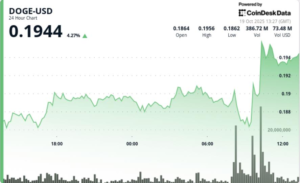The SEC’s Game-Changing Approval of Crypto ETPs: What It Means for the Industry
As Washington navigates through a lengthy shutdown, a pivotal moment in the cryptocurrency landscape has emerged with the SEC’s recent approval of generic listing standards for crypto exchange-traded products (ETPs). This landmark decision allows exchanges to list qualifying crypto ETPs without the need for individual rule filings. This structural change ends years of regulatory limbo, setting the stage for rapid innovation in the industry. In this article, we’ll explore the implications of this development and why it represents a watershed moment for crypto.
A Swift Path to Launch New ETPs
The approval of generic listing standards drastically reduces the time it takes to launch new ETPs. Previously, the SEC review process could take up to 240 days for each product, but under the new guidelines, compliant products can be launched in as little as 75 days. This streamlined timeframe significantly mitigates the uncertainty and financial burden associated with launching new ETFs, crucial for issuers who often invest considerable resources in legal and registration fees.
With shorter timelines, the crypto ETP market is poised for rapid expansion, potentially introducing a variety of spot-coin ETFs beyond Bitcoin and Ethereum, including assets like Solana and XRP. As the industry shifts from uncertainty to action, the groundwork is being laid for unprecedented growth in crypto ETP offerings.
Empowering Financial Advisors with Broader Access to Crypto
The SEC’s rule change has opened the floodgates for financial advisors to include cryptocurrencies in portfolios more easily. Prior to this, few compliant options were available to advisors, as major asset managers like Vanguard often refrained from offering access to spot bitcoin ETFs. This left many investors without proper avenues to invest in digital assets.
Now, with the introduction of diversified crypto ETFs hitting the market, advisors can finally present index-like exposure to cryptocurrencies through familiar platforms. In fact, Grayscale quickly secured approval to convert its Digital Large Cap Fund into the Grayscale Crypto 5 ETF, providing clients access to the five largest coins. This shift is monumental for wealth managers, enabling seamless allocation to crypto in a portfolio alongside traditional assets like equities and bonds.
Bridging the Gap Between Crypto and Traditional Finance
The integration of regulated ETPs into mainstream finance will further cement cryptocurrency’s role within the broader financial ecosystem. As digital assets become encapsulated in regulatory structures, they can be more seamlessly integrated with existing banking operations. JPMorgan Chase recently announced it would accept crypto ETF shares as loan collateral, mirroring traditional practices involving stock ETFs.
This development is vital as it allows banks to lend against crypto holdings, positioning cryptocurrencies as active players in credit markets. By breaking down barriers between traditional finance and digital assets, the cryptocurrency sector is no longer isolated; it becomes a vital cog in the financial machinery, akin to stocks and Treasurys.
Promoting Innovation Through Clear Regulatory Frameworks
One of the most significant changes comes from the SEC’s shift in philosophy regarding cryptocurrency regulation. Under the leadership of SEC Chair Paul Atkins, the agency has initiated Project Crypto, which aims to refine securities laws to better accommodate the evolving landscape of digital assets.
This newfound clarity presents a fertile ground for innovation within the crypto space. When market participants understand the regulations, they can develop new products with confidence. Companies are already racing to launch innovative offerings under this framework, from multi-coin index ETPs to experimental yield-bearing token funds. The U.S. stands to become a hotbed of innovative financial products if this momentum continues, countering trends that may see innovation migrate overseas.
A Paradigm Shift for Crypto Acceptance in Portfolios
The SEC’s approval of generic listing standards is a significant milestone for the credibility and acceptance of crypto within mainstream investment portfolios. This isn’t just about enabling ETPs; it symbolizes the recognition of cryptocurrencies as legitimate assets integral to modern financial strategies.
For financial advisors, the ability to offer diverse crypto investment options allows them to meet client demand more effectively. Investors will benefit from enhanced choice and convenience, as they can finally incorporate digital assets into their traditional portfolios seamlessly. Likewise, innovators in the financial sector will find new opportunities to develop forward-thinking products, reaffirming the U.S.’s commitment to remaining at the forefront of the global financial landscape.
Conclusion: A Bright Future for Crypto Integration in Finance
The SEC’s decision to approve generic listing standards for crypto ETPs represents a monumental shift in the financial ecosystem, paving the way for enhanced accessibility and integration of cryptocurrencies into everyday finance. This change is more than regulatory groundwork; it signifies a newfound acceptance of crypto as a legitimate player in the modern investment landscape.
With improved timelines, expanded advisory possibilities, deeper integration with traditional banking, and a focus on regulatory clarity, the stage is set for transformative innovations in the crypto sector. As these opportunities unfold, the potential for growth and competitive advantage is immense, bolstering the U.S.’s position in the global financial arena. The road to an on-chain financial system is clearer than ever, instilling confidence and optimism for the future of crypto.

















